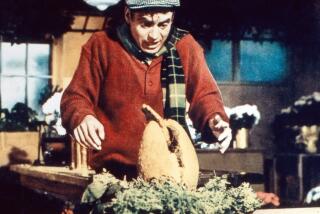MOVIE REVIEWS : LACMA Marks Lubitsch Centenary
- Share via
The American moviegoing public has the mind of a 12-year-old child; it must have life as it isn’t. That’s the only handicap of the American screen; you have everything else.
--Ernst Lubitsch
Ernst Lubitsch--whose centenary is celebrated with a retrospective through June 13 at the Los Angeles County Museum of Art--was the master of a kind of film barely made any more: witty, sparkling romance. They were his specialty: the Venetian nights of “Trouble in Paradise” (June 6), the Parisian flings of “Ninotchka” (June 13), the Budapest heartaches of “The Shop Around the Corner” (Saturday).
Lubitsch, whom Jean Renoir called “the man who invented Hollywood,” the director’s director of the “Golden Age,” is, in today’s movie world, exemplar of a discarded heritage. Yet, in his heyday, from 1924 to 1946, he turned them out effortlessly: romantic comedies in continental or upper-class settings with casts that played with an almost insolent urbanity and expertise.
Perfection of performance, as well as of writing (Samson Raphaelson, Ben Hecht and Billy Wilder) was a Lubitsch trademark. These movies were at once elegant and ribald, sophisticated and earthy, urbane and bemused, frivolous yet profound. They were directed by a man who was amused by sex, rather than frightened of it--and who taught a whole culture to be amused as well.
Lubitsch didn’t invent the sophisticated American romantic comedy--Chaplin did in the 1923 “A Woman in Paris”--but he refined it. His post-1924 movies are comedies about sexual behavior, yet they never show much sex, beyond the obligatory last kiss. Instead, they focus on all the fuss and folderol around it: the absurd jealousies, affectionate romps and hilarious hypocrisies. Like all psychologists, he had a favorite visual symbol: the door, the doors always being opened or peeked through--usually by Lubitsch.
He was born the son of a Jewish tailor-clothier, and his passage into movies was rapid: from Max Reinhardt’s Deutsches Theater to stunning popularity as a silent-film comic, to world fame as a director of historical epics. Hollywood beckoned in 1923--and kept him. “I’ve been to Paris, France, and I’ve been to Paris, Paramount,” he once said. “I prefer Paris, Paramount.”
There, he had unusual status, his films so universally admired by critics and filmmakers that they didn’t have to be hits to retain his prestige. “The Lubitsch Touch” became a universal catch-phrase, and, from 1924 to 1932, his string of critical successes was almost unbroken. Afterward, except for “Ninotchka,” he was said to be in decline--though, today, it is the later Lubitsch films that are most prized and frequently revived.
Lubitsch may have concurred. He once said that “in the opinion of many people” (meaning himself), his three best were “Trouble in Paradise,” “Ninotchka” and “Shop Around the Corner.” He also vigorously defended the hilarious 1942 anti-Nazi comedy, “To Be or Not to Be” (next Friday) and the humane 1943 philanderer’s tale, “Heaven Can Wait” (June 12).
1940’s “Shop Around the Corner” is my own favorite Lubitsch: perhaps the most beautifully directed romantic comedy from any Hollywood studio. It’s also, except for the anti-war “The Man I Killed” (June 12) his most idiosyncratic American movie: set far from upper-class haunts, in a little Budapest shop where a clerk (Margaret Sullavan) and salesman (Jimmy Stewart) unknowingly carry on a romance by post, while bickering in real life. Outside, the streets are dark and cold, snowy and uncertain; inside, there’s both conflict and warmth.
“It must be hil - ah - rious, “ Lubitsch always admonished his writers. But truth, of course, is the door he was always opening, even in his poshest palaces, his most gossamer boudoirs; it’s the wellspring of all his “touches.” And truth, as much as sophistication or irony, wit or beauty, is what seems most lacking in today’s movies. And in the Hollywood Lubitsch left. Information: (213) 857-6010.
More to Read
Only good movies
Get the Indie Focus newsletter, Mark Olsen's weekly guide to the world of cinema.
You may occasionally receive promotional content from the Los Angeles Times.










